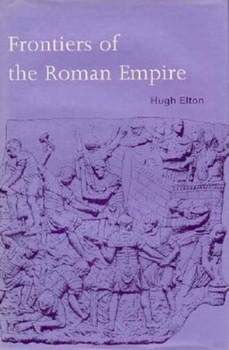Frontiers of the Roman Empire
Select Format
Select Condition 
Book Overview
With its succinct analysis of the overriding issues and detailed case-studies based on the latest archaeological research, this social and economic study of Roman Imperial frontiers is essential... This description may be from another edition of this product.
Format:Hardcover
Language:English
ISBN:0253331110
ISBN13:9780253331113
Release Date:December 1996
Publisher:Indiana University Press
Length:150 Pages
Weight:0.20 lbs.
Dimensions:0.8" x 6.4" x 9.4"
Customer Reviews
1 rating
Succint yet Informative
Published by Thriftbooks.com User , 24 years ago
In this slim volume, Dr. Elton provides an informative overview of Roman administrative and commercial relations at the extremities of the empire. One of the author's themes concerns the treatment of "frontier" in the literature, particularly its emphasis on fortifications, with which the author takes issue. Dr. Elton contends, quite reasonably, that the frontier was composed, not of well-defined boundaries, but of overlapping zones of influence - some areas under direct Roman control, while other regions serving as conduits for trade. A natural border, such as a river or mountain range might provide a reference for demarcation, but apparently did not prevent exchange of people or material in any substantial manner. The might of the Roman army encouraged local kings to form alliances with Rome, and gradually these regions would be annexed into provinces. Legions could be concentrated on a region for conquest and later dispersed for engineering public works projects or pursue bandits. In the wake of the soldiers were traders who supplied the army's material needs. According to Dr. Elton, passage across regional borders were readily accessible to traders, who could acquire wealth, and consequently animosity from locals, possibly exacerbated by the economic distortions caused by the influx of large numbers of men not involved in agricultural production. Now and again, a revolt had to be suppressed, and Dr. Elton illustrates the example of Gaul in 69-70 taken from Tacitus' _Histories_. Roman administration generally concentrated on levying taxes and collecting customs duties, rather than transformation of a local society. This policy may have benefitted from the multi-lingual fluency of the empire's inhabitants, at least in urban regions. Alexander's empire had spread the Greek language in the west (augmented by Latin), while Aramaic and Syriac were understood in the east, all serving as multiple forms of lingua franca in their respective areas. _Frontiers_ challenges the narrow focus on many classical studies devoted to either political intrigues among the ruling classes in the capitals. By rendering an economic dimension to the relationships between Romans and the barbarians with whom they had contact, Dr. Elton provides a better understanding on the world in which people lived outside of Rome during the early centuries of imperial rule. A commendable work.






